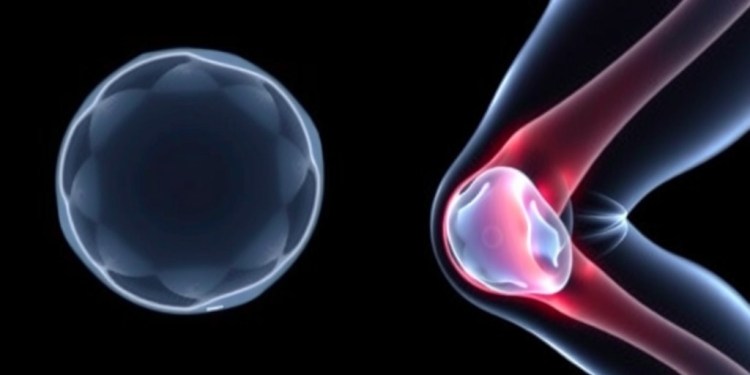
Over the years, meniscus tears have emerged as one of the most prevalent knee injuries affecting both athletes and the general population alike. The challenges posed by such injuries have continued to perplex medical professionals, who have sought a reliable method for effectively repairing meniscal damage. A groundbreaking development has recently come to light, revealing an innovative approach utilizing a 3D-printed hydrogel derived from cow meniscus tissue. This new treatment modality may herald a transformative change in how these injuries are managed, offering hope to countless individuals suffering from knee pain. Researchers from the Perelman School of Medicine at the University of Pennsylvania conducted a preclinical study, unveiling promising results that highlight the potential of this novel hydrogel for enhancing meniscus repair.
The meniscus is an intricate structure that plays an essential role in the biomechanics of the knee. Acting as a crucial shock absorber, the meniscus must effectively distribute weight across the knee joint while providing stability and cushioning during movement. Given its complexity, a standardized treatment approach may not suffice for all patients. Traditional repair and reconstruction options have often fallen short of fully addressing the varying needs dictated by individual cases. Recognizing this gap, the Penn researchers embarked on a mission to create a tailored treatment that can adapt to the specific characteristics of meniscal injuries, fostering the possibility of more optimal healing outcomes.
At the heart of their innovation lies the hydrogel, a material renowned for its flexibility and ability to absorb water. Initially used in commonplace applications such as contact lenses and baby diapers, the research team has adapted this material for a groundbreaking purpose. They devised a specialized hydrogel by extracting proteins from donor cow meniscus tissue. These proteins play a vital role in directing the regeneration of new cells, guiding them to become the appropriate repair cells needed to restore the injured meniscal tissue. This approach allows the hydrogel to provide a biologically compatible scaffold that supports tissue regeneration.
A noteworthy aspect of this research is the meticulous decellularization process employed by the scientists. By removing cellular components from the cow tissue while skillfully preserving its structural integrity, the team effectively mitigated the risk of immune rejection upon implantation. This critical process enhances both the safety and efficacy of the treatment, enabling patients to heal without facing as many complications as traditional graft methods may entail. The technique not only paves the way for a safer response in the host but also maximizes the hydrogel’s compatibility with the human body.
To further enhance the customization of the hydrogels, the research team employed advanced 3D-printing techniques, allowing them to tailor the structure of the hydrogel to the specific biomechanical properties required by different regions of the meniscus. This precision is paramount because mismatched tissues can result in incomplete healing. By aligning the hydrogel with the unique characteristics of the target area, the researchers aimed to foster more successful integration and recovery post-surgery.
In their animal studies, the researchers reported promising findings regarding the hydrogel’s performance. Observations indicated that the hydrogel integrated seamlessly with the surrounding meniscal tissue, suggestive of a potentially more effective recovery journey for patients. Such integration is vital for the success of any meniscal repair, as the goal is to restore the knee’s functionality and alleviate pain. The novel hydrogel approach represents a more refined, biologically aligned solution to healing meniscus injuries compared to existing treatment options.
Transitioning from impressive small mammal studies, the research team aims to move into large animal models to further validate the hydrogel’s potential. This crucial step is necessary to ensure that the treatment’s safety and efficacy can be demonstrated on a larger scale before embarking on human trials. Alongside these advances, Heo expressed optimism regarding their future clinical objectives, emphasizing the intention to treat smaller, localized meniscus tears initially. These goals serve as stepping stones, with the ambition of addressing more complex injuries as the research progresses.
Hope is on the horizon for patients who have long endured the limitations of conventional treatments. Doctors and researchers alike are enthusiastic about the potential this 3D-printed hydrogel holds for revolutionizing meniscal repair protocols. By embracing a more personalized approach to treatment, this advanced methodology promises to improve patient outcomes significantly. As the research team continues to explore the depths of this technology, they aim to combine rigorous scientific inquiry with patient-centered care, offering renewed possibilities in orthopedic medicine.
This innovative study opens doors for a broader conversation regarding not only knee injuries but also the potential for future advancements in tissue engineering and regenerative medicine. The collaboration between biologists, engineers, and clinicians is crucial to developing treatments that effectively address the complexities of various injuries and conditions. As research continues to unfold in this exciting domain, the implications of such smart biomaterials could reach far beyond knee injuries, inspiring further innovations across the spectrum of orthopedic challenges.
In conclusion, the evolution of 3D-printed hydrogels promises a fresh perspective on managing meniscal tears. By recognizing and addressing the distinctive properties of meniscal tissue, researchers have the opportunity to create a more effective solution that aligns with the needs of individual patients. While the path to clinical implementation remains ahead, the enthusiasm generated by preliminary findings indicates that the future of meniscus repair could be headed towards a paradigm shift, better aligning the science of medicine with the needs of human healing.
Subject of Research: Animals
Article Title: Precision repair of zone-specific meniscal injuries using a tunable extracellular matrix-based hydrogel system
News Publication Date: Not specified
Web References: https://www.sciencedirect.com/science/article/pii/S2452199X25000611?via%3Dihub
References: Not specified
Image Credits: Not specified
Keywords
Meniscus, Hydrogel, 3D Printing, Tissue Engineering, Knee Injuries, Biocompatibility, Decellularization, Regenerative Medicine, Orthopaedics, Precision Medicine, Shock Absorption, Material Science.
Tags: 3D-printed hydrogel technologybiomechanics of the kneechallenges in meniscus repaircow meniscus tissue applicationcustomizable hydrogel treatmentinnovative orthopedic treatmentsknee injury solutionsmeniscus injury repairPerelman School of Medicine researchpersonalized knee carepreclinical study resultstransformative medical advancements





